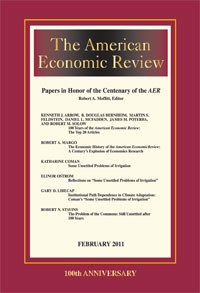
\van Veelen\, M. and \van der Weide\, R. (2008). A note on different approaches to index number theory American Economic Review, 98(4):1722--1730.
-
Affiliated authorsMatthijs van Veelen, Roy van de Weide
-
Publication year2008
-
JournalAmerican Economic Review
In the literature, two approaches to index numbers are distinguished: the axiomatic approach and the economic approach. In this note we discuss the way in which these two approaches differ and how that affects what the numbers mean. The difference is regularly described as one between an approach that does and an approach that does not assume that quantities arise from optimizing behaviour. We argue that a more accurate description is that the difference lies in whether or not optimizing agents, or representative consumers, are assumed to optimize the same utility function. It is exactly this distinction that sets the (different) limitations of both approaches for constructing a meaningful indicator of real income.